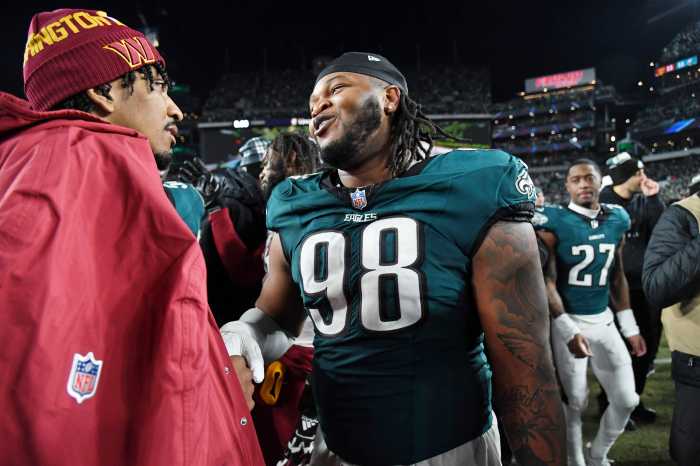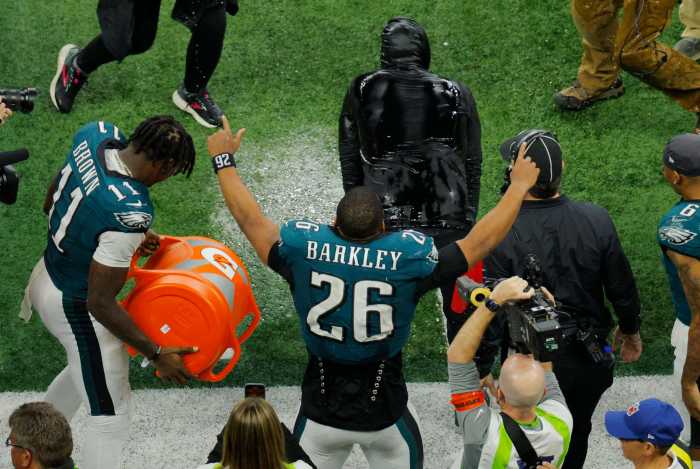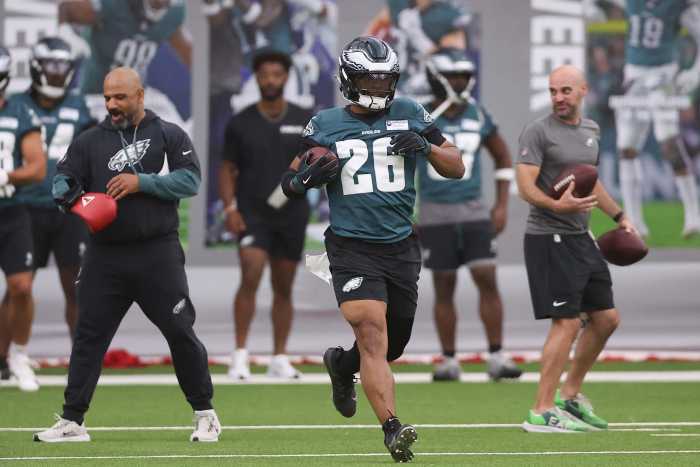For two consecutive weeks, the Philadelphia Eagles have found themselves not only on the losing end of their games but utterly embarrassed by “fellow” NFC contenders. Perhaps more frustrating than the losses themselves is how the team has lost these games. Both losses by three scores, the team has struggled to even look competitive on either side of the ball.
Whether it’s the excessively vanilla offense, inconsistent tackling effort, or untimely turnovers, the points of frustration throughout the season have become more evident against stiffer competition. As those frustrations continue to multiply and intensify, the Eagles have failed to adjust accordingly.
In place of those adjustments this season, the Eagles have prattled on about adversity, spoken in proverbs, or taken to the internet to either defend or vindicate themselves. Certainly, this is a far cry from the environment that has consistently been preached in recent years.
Since his arrival in Philadelphia, head coach Nick Sirrianni has attempted to instill five core values. Those are — connect, compete, accountability, fundamentals, and football IQ. Over his tenure with the team, one could see each of these values instilled, but this season has certainly been an outlier.
Instead of not only acknowledging but addressing their shortcomings, the team has opted instead to resist humility, honesty, and accountability.
Pride and Athletics
One major obstacle between the Eagles and accountability is a fight that everyone fights on a daily basis, that being pride. Now, pride is not inherently evil, and for most athletes and competitors, it’s even necessary as they strive to be not only their best selves, but also better than the opposition.
At its best, pride can be molded into determination, allowing teams to overcome adversity and players to perform when they’re needed most. This is especially true of the cornerback and wide receiver positions.
Deion Sanders, Terrell Owens, one could go on ad nauseam naming every pride-filled corner or wideout. Often referred to with the term “swagger,” there is an aspect of pride that is nearly necessary to play the game at its highest level, particularly at those positions.
Unfortunately, that is not the form of pride that the Eagles have displayed at various points this season.
Veteran cornerback Darius Slay has often been guilty of a more harmful form of pride, one that has led him to spend far more time on social media than he arguably should. Shortly after Sunday night’s game against Dallas, Slay took to Twitter, liking and retweeting a post that referred to his defensive pass interference penalty as “a bogus call.”
While the controversial flag could easily be argued as a bad call by the officials, taking to Twitter so shortly after an embarrassing loss to interact with such a post is thoroughly unproductive. While Slay performed relatively well Sunday night, this trend of social media hyper-fixation is unnecessary and counterproductive.
Slay wasn’t the only Eagles player who engaged in the age-old art of deflection.
One of the key issues that plagued the Eagles against Dallas was Philadelphia’s inability to take care of the ball in key situations. Three untimely fumbles, one from Jalen Hurts, another by Devonta Smith, and yet one more from A.J. Brown, defeated any chances of the Eagles building any offensive momentum.
Zach Berman of PHLY shared a postgame quote from Eagles wide receiver A.J. Brown, who was asked about those fumbles and replied:
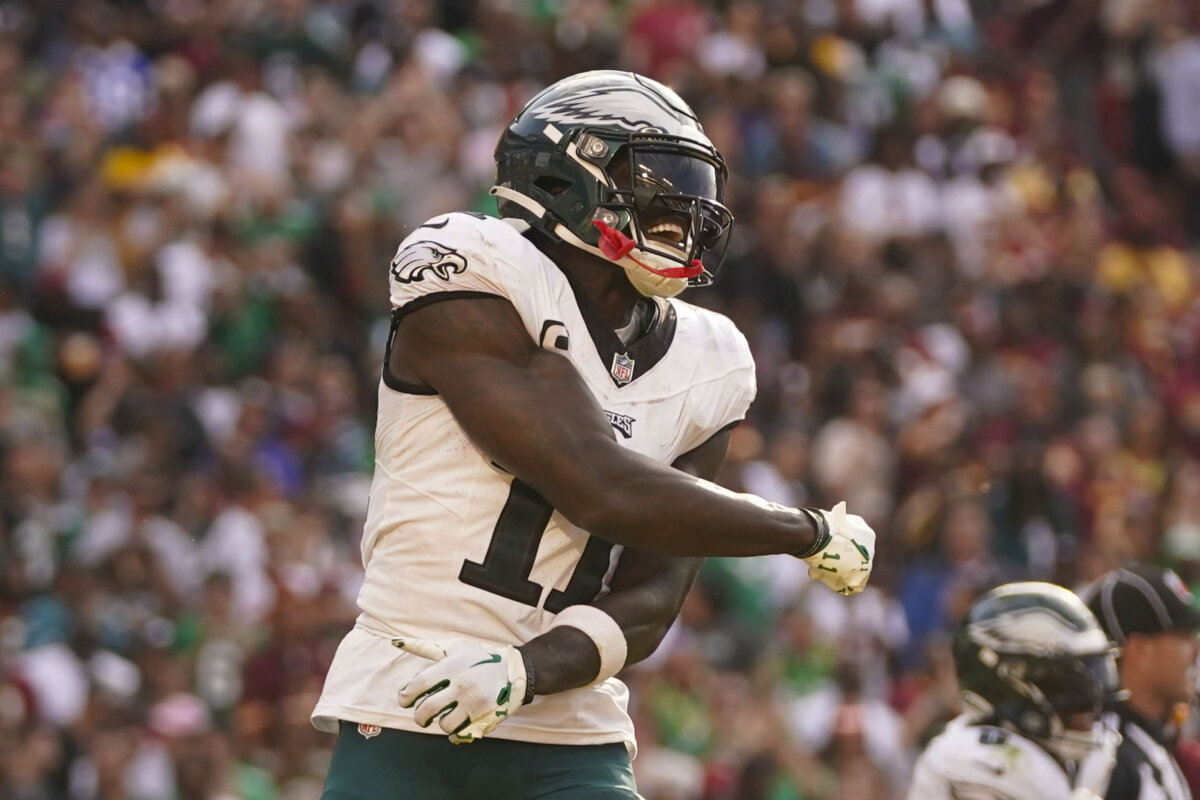
“I think we are trying to make plays, man. You know? Of course we have to hold onto the ball. But we are trying to make plays. Holding onto the ball, of course we want to hold onto the ball. But that’s the least of our worries. That’s just me being honest.”
To Brown, this may be honesty. To many others, this is a clear lack of accountability. To Brown’s credit, there are many concerns facing the Eagles at this present moment, but to refer to those three key fumbles as “the least of our worries” is far from honest.
Turnovers are not only drive killers; they’re scoring opportunities for the opposition. While there are more factors to a game than just turnovers and turnover differential, it often coincides with team success. Since the dawn of the Super Bowl era, only eight teams have walked away with the big win while finishing with a negative turnover differential. That equates to less than 15 percent.
Instead of owning the mistake or even acknowledging it, Brown was happy to pass the buck. There’s no way to know or legitimate reason to speculate what or who Brown was referring to, but it’s clear that he wasn’t speaking about himself, and that’s the real issue here.
This is also not to say that Brown and Slay, or for that matter, the corner and wideout groups, are the only parties guilty of this. The unfortunate truth is this is something the entire team has struggled with all season.
Like Slay, running back Kenneth Gainwell and rookie corner Eli Ricks have been guilty of defending themselves on social media during or shortly after a game instead of focusing on the task at hand. No one but those in that type of situation can understand the frustration of social media trolls and the hateful speech these players, and far too often their loved ones, receive on a daily basis. Even still, as a professional, all of that noise must be tuned out, especially during and around game time.
Pride goes beyond the Eagles players
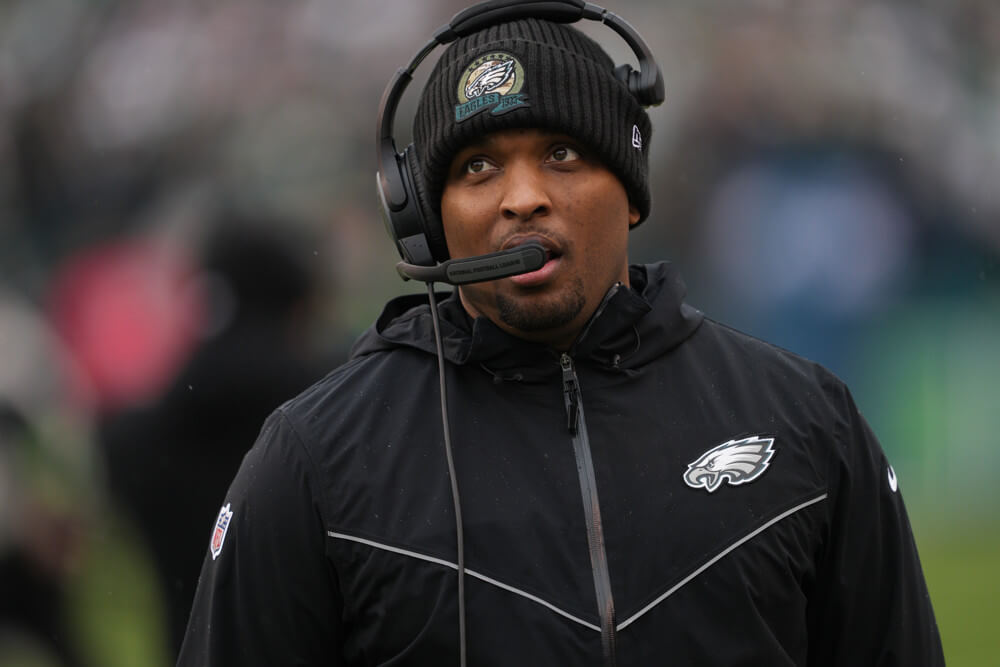
Pride has played a role in the unwillingness to adjust the game plan, which continues to flounder week in and week out. While Jalen Hurts’ lingering knee injury could be fingered for some of the blame, nothing that has been seen from Brian Johnson, or Nick Sirianni for that matter, suggests that there is anything more to this offensive scheme than meets the eye.
Leaning away from RPOs while appearing utterly allergic to the concept of utilizing motion, the lack of any wrinkles to the offensive game plan has often handcuffed the entire offense. In fact, it’s difficult to even understand what the goal of this offense is.
Receivers are blanketed, defenses are not required to respect the run game, and there is frankly no mystery to the scheme. While the players have failed to perform on many occasions, the job of the coaching staff is to put their players into a position to succeed, and that certainly has not been accomplished.
This isn’t a call for the heads of Brian Johnson or Nick Sirianni, but a call to action. Instead of treading out the same tired song about the need for accountability, it’s time for the coaching staff to be active instead of passively waiting for the situation to be figured out, but accountability is easier said than done.
Accountability is easier said than done
It is far easier to lean into one’s sense of pride than to be truly accountable. For a team that has spoken so often about the need to be accountable, the Philadelphia Eagles sure have had a hard time putting it into practice. It’s certainly difficult to swallow one’s pride and acknowledge one’s mistakes. That’s true for anyone, but one cannot rely on difficulty as an excuse while continually preaching about the concept of accountability.
Players must own up to mistakes and improve upon their game to ensure they are not repeated, and much in the same way, the coaching staff should also be. After all, how could the coaches expect accountability from their players if they are unwilling to be held to the same standard?
If accountability is truly a core value, then it must not only be preached, but practiced by the organization. There is no one innocent in the Eagles’ recent struggles. From players, to coaches, to even the front office for failing to value certain positional groups adequately, blame should be spread across the board.
For now, the Eagles must abide by a tired adage and control what they can control. That starts with taking ownership of their failures. From there, they must strategize and implement a plan to overcome the adversity they love to discuss. And finally, the fabled step 3: profit.
The playoff destiny of the Philadephia Eagles is firmly in their own hands. While four games against the Seahawks, Cardinals, and the New York Giants may not be able to qualm every concern ahead of the playoffs, it’s about creating tangible, progressive growth for Philadelphia, and that starts with exchanging pride for accountability.

